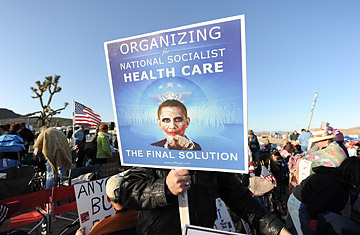
Tea Party supporters protest health care reform in March
For all their bluster about rolling back health reform, congressional Republicans won't be able to repeal the Affordable Care Act (ACA) or drastically underfund it without risking a government shutdown. The GOP leadership knows all too well that could backfire — as it did in 1995 — but some Republican officials at the state level think the party doesn't even need to make that political gamble: they're vowing to do everything in their power to resist implementation of what they derisively dub Obamacare.
This hard-line approach may be good for rallying the conservative base, but it may not have the desired affect of slowing implementation of health reform. In fact, such fierce opposition could itself backfire, inviting more federal control over the implementation of reform in states where leaders buck the ACA.
Alaska and Minnesota are the only two states that have so far refused to apply for ACA grant funding to begin designing exchanges. (Other states have refused to participate in other reform components, like insurance programs for high-risk individuals.) Alaska's Republican governor says he won't move forward on any ACA implementation until court cases challenging the law are resolved. (Twenty-one states, including Alaska, are challenging the constitutionality of the ACA in federal court.) Minnesota's Republican governor Tim Pawlenty, who many believe plans to run for President in 2012, issued an executive order barring state officials from participating in the ACA without express approval.
Kathleen Sebelius, Health and Human Services Secretary, says she hopes "pragmatic" governors will implement health reform in an orderly fashion, despite political opposition. "This is one of the most state-friendly laws I've ever seen," says Sebelius, formerly the governor of Kansas. "It all starts with the assumption that the states take the lead. Not only does this come with that assumption, but it comes with resources."
And it also comes with a different kind of incentive — the ACA contains clear language allowing the federal government to take over major reform components that states refuse to implement. This means state leaders opposed to "government takeovers" could be inviting just that. While the law is clear on the federal government's power to step in, it's not known what would trigger such an action. Regulations outlining the conditions under which a state would be deemed inept at launching an exchange, for instance, have not yet been issued. Department of Health and Human Services officials have signaled they intend to allow some variation among state approaches, perhaps to avoid the appearance of overreaching. It's clear, however, that governors determined to sit on the sidelines and bar the use of state resources for implementation will have little control over how reform takes shape for their own constituents.
To understand how health care reform ended up with such a fail-safe mechanism, one needs to remember the drawn-out, tortured process that produced the law. The final bill mirrored legislation that emerged in the fall of 2009 from the Senate Finance Committee. This version was the most conservative and state-centric of all the health-reform bills crafted by Democrats. Another Senate committee had favored a public option, and the House bill would have created a national health-insurance exchange. The Finance Committee's bill, however, contained no public option and gave states the responsibility to enforce new health-insurance regulations and create health-insurance exchanges.
This approach was meant to draw support from conservative Democratic Senators, and it worked. But ceding power to the states for the exchanges, the Web-accessible health-insurance marketplaces due to come online in 2014, was a controversial decision. At the time the Senate Finance Committee bill was being debated, progressives railed against the bill, arguing that a public insurance option was necessary to hold private insurers accountable. Jacob Hacker, a Yale political-science professor and health-policy expert credited with inventing the idea of a public option, also criticized the Finance Committee bill for its state-centric approach. He said this strategy was "a way of punting on crucial structural elements" and warned that it could lead to a patchwork, with some states offering better consumer protections than others.
It's not clear if Hacker just anticipated states taking a lackadaisical approach to reform or if he foresaw a far more extreme reaction — that some state leaders would buck reform altogether. "If [state] political leaders are less interested in putting the law in place effectively than they are in scoring political points, it's absolutely beneficial to have a greater federal role in setting up the exchanges," Hacker says now.
The fact that states could end up inviting more federal control if they try to defy Washington is all the more ironic because until recently state health insurance exchanges — unlike some other reform elements — had bipartisan support. Free-market proponents on the right have historically favored exchanges for the way they foster competition and consumer choice; the right-leaning Heritage Foundation supported state marketplaces as recently as mid-2009. "An exchange is not an inherently partisan issue," says Sabrina Corlette, a research professor at Georgetown University's Health Policy Institute. "It's a free-market kind of concept. And yet there has been a lot of heated rhetoric on this stuff."
At this early stage of implementation, however, the only resources available to get the exchanges up and running are federal grants, which states must apply for. This puts some Republican governors in precarious positions: admit the ACA contains funding they want for their states, or buck the law and set the table for a real federal takeover.
